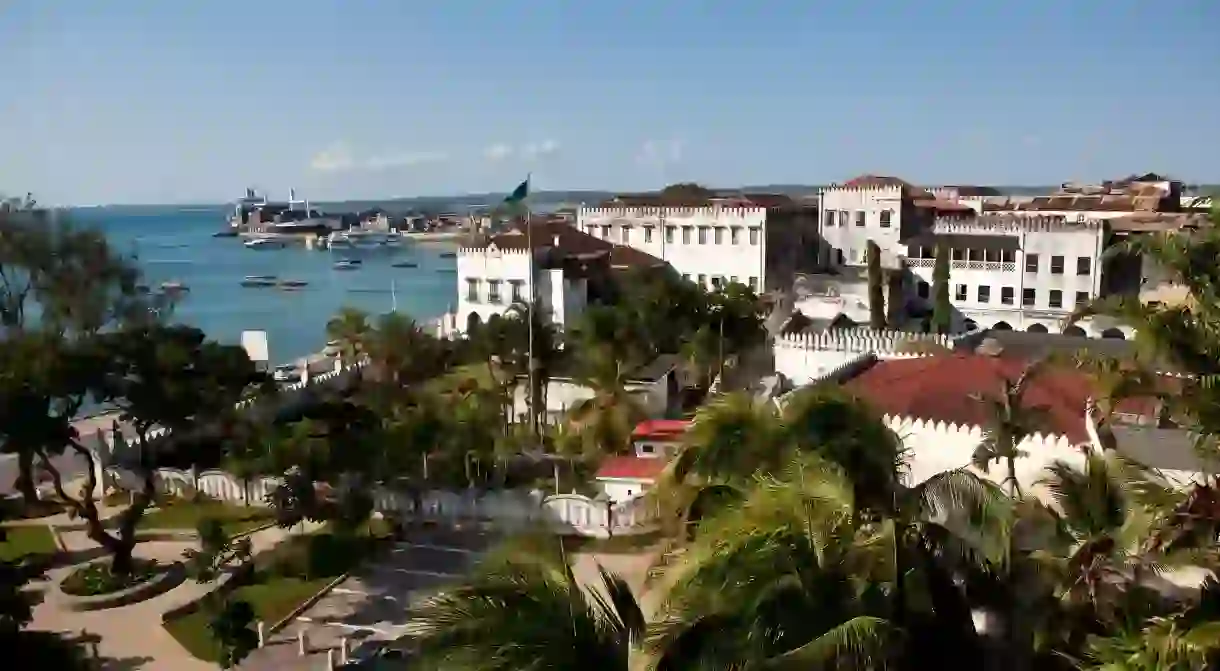How to Spend a Weekend in Stone Town, Zanzibar

It’s been 20 years since Stone Town was named a UNESCO World Heritage site. Situated at the western edge of Zanzibar’s capital city, Stone Town is the epicentre of the island’s rich cultural history and boasts a melting pot of Arabic, Indian and European architecture alongside indigenous East African elements. This guide will help you get the most out of a two-day visit.
Day One
Morning – walk the heritage trail
Before the weather heats up, take a stroll along Mizingani Road. Head east from the taxi station with the calm Indian Ocean to your left and some of Stone Town’s most glorious heritage buildings on your right. You can easily find your own way around this town, which covers less than one square kilometre. Start your visit by exploring the 17th-century Old Fort, the oldest building in town, then visit the Old Dispensary with its distinctive green paint job – be sure not to miss the enormous fig tree outside.

Afternoon – Tanzanian coffee stop
Pause for a coffee break in the midst of getting your bearings around the warren of alleyways that make up the inner streets of Stone Town. Zanzibar Coffee House is fronted by an all-female staff and serves delicious Tanzanian coffee. Sip a locally spiced version on the rooftop, which offers 360-degree views of the town. Descend back to the maze and have a good explore; it’s obligatory to get lost and stare in awe at the decorative Arab-style doorways.
Pro tip – the Zanzibar Coffee House rooftop is reserved for hotel guests after 3pm
Evening – high-end sundowners with high-end ocean views
Your feet will be tired from a day of walking the hot streets, so you’ve earned a sundowner at a bar with one of the best sea views in town. The Africa House Hotel is one of the more expensive places for a drink, but the price tag is worth it to watch the sun setting behind traditional dhows bobbing in the shallows. After drinks, walk along the coastal road and grab some street food from the night market at Forodhani Gardens; queuing locals will guide you to the best dishes. Bed down for the night at the exquisite Emerson Spice Hotel, a lovingly restored old merchant’s house.

Day Two
Morning – spice up your life at Darjani Bazaar
After a relaxing breakfast, it’s time for a shopping spree. Head to the Darjani marketplace early in the morning to see the best of local produce. Pick up souvenirs at the Spice Market, including spices, scented soaps and coffee, but be aware that traders stock similar wares and will put a pressure on you to make a purchase. Before you lose your cool, head back into town for a more relaxed shopping experience.
Pro tip – don’t be afraid to haggle for a better price
Afternoon – discover Zanzibar’s history
Zanzibar was the centre of the East African slave trade for many years, with most deals passing through Stone Town’s market. The Christ Church Anglican Cathedral has been built on the site of the last slave market, and the East Africa Slave Trade Exhibit inside provides a stark history lesson. Reflect on your time here over lunch at Lukmaan, a seriously affordable and down-to-earth restaurant. Check out the extensive smoothie menu featuring flavours like baobab and soursop.
Pro tip – give at least two hours to fully explore the Anglican Cathedral

Evening – indulge your ears with a musical performance
Back at the Emerson Spice, the rooftop Tea House restaurant serves a five-course seafood degustation menu at 7pm (booking is essential). There isn’t much nightlife in Stone Town, but if you time it right you can catch some fantastic live music. The Dhow Countries Music Academy (DCMA, @dcmazanzibar) teaches traditional regional music styles such as taarab and hosts regular weekly concerts. The school itself is open to visitors, and it’s worth popping in to hear the students practising. If there’s nothing on at the DCMA, try the Livingstone Beach Restaurant, which hosts jazz evenings.
Pro tip – check the DCMA website for details of upcoming concerts to be sure you don’t miss out













